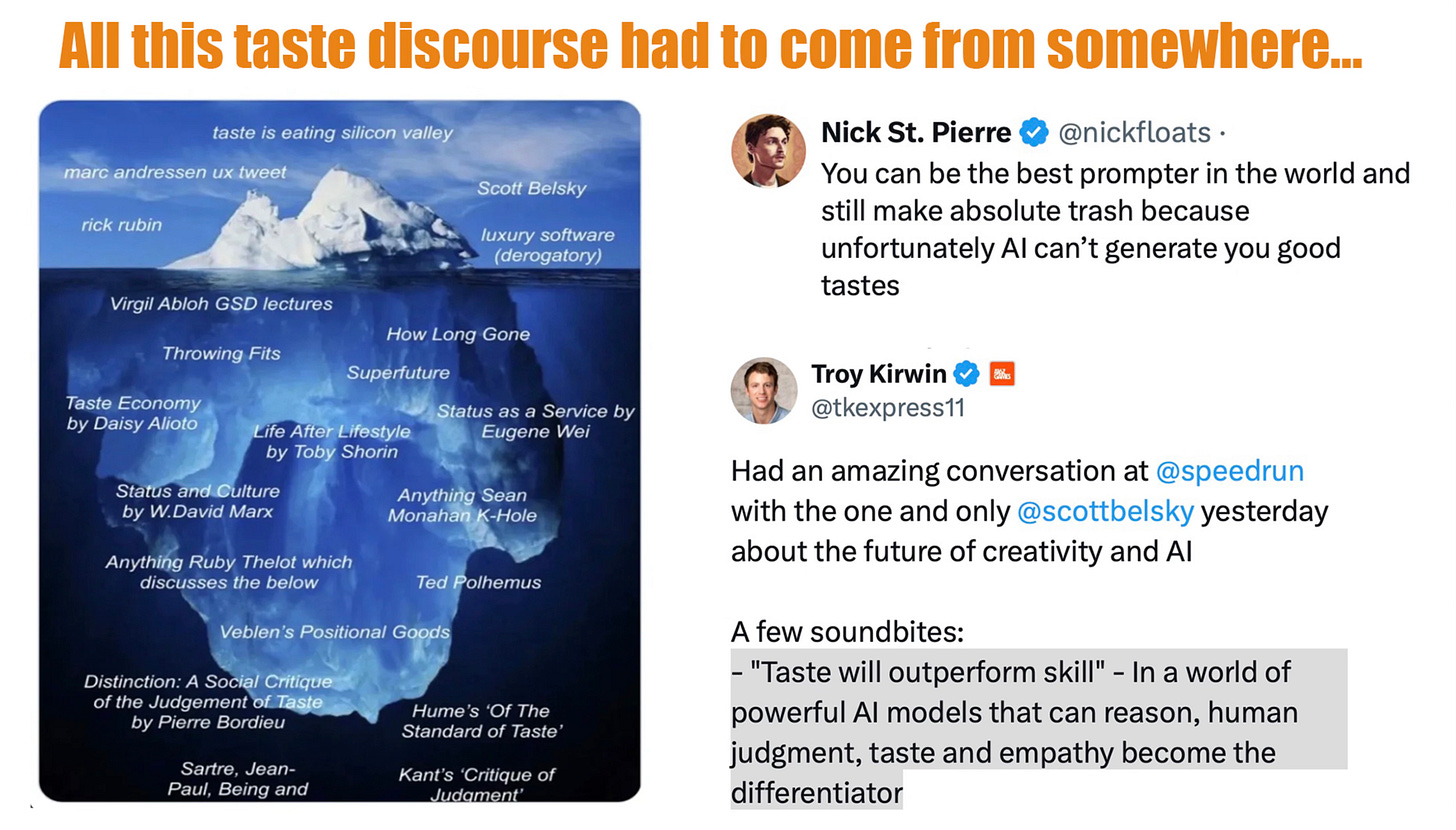When Everyone Has AI, Who Needs Your Taste?
There's something both liberating and terrifying about watching AI generate a month's worth of creative work in minutes. 😳 Beyond the immediate awe and anxiety is a more interesting question...
As AI democratizes creative production - just as high-level languages democratized programming - we need to rethink how agencies create value.
Conventional wisdom suggests that when technical execution becomes commoditized, taste becomes the differentiator.
But this assumes a universal standard of taste exists. It doesn't. What’s cool to Gen Z might be cringe to millennials (or is it the other way around?). What’s respectful in Tokyo might be too formal in São Paulo. What’s premium to one group might seem wasteful to another. One VC’s Patagonia vest and Allbirds is, well, let’s just leave that one alone.
What we're really talking about is cultural intelligence: the ability to navigate multiple frameworks of value and meaning across different contexts.
What we're really talking about is cultural intelligence: the ability to navigate multiple frameworks of value and meaning across different contexts.
Consider what happens when anyone in an agency can generate compelling visuals, write decent copy, or produce serviceable pitch-quality videos using AI. These technical aspects of advertising - once a moat protecting established agencies - become table stakes. But what replaces them isn't simply "good taste." It's something more dynamic.
Agencies that creatively thrive will excel at three things:
First, cultural navigation. They'll understand how meaning and value shift across different contexts, communities, and cultures. They won't impose a single taste framework but will move fluidly between many.
Second, collective intelligence. Success won't come just from individual brilliant minds but also from diverse teams that bring multiple perspectives to creative problems. This diversity isn't just demographic - it's cognitive, experiential, and cultural.
Third, adaptive judgment. They'll combine human insight with AI capabilities, using data and research to inform creative decisions while maintaining human empathy, cultural sensitivity and an unquenchable curiosity to keep learning and playing with what’s new.
This has several implications:
1. Creative leadership becomes even more about orchestrating diverse perspectives than only imposing singular vision.
2. Small agencies can compete through specialized cultural expertise and adaptability.
3. Client relationships evolve into learning partnerships, where both sides develop better cultural intelligence together.
The irony is that many agencies are optimizing for the wrong things - not just in terms of tech-driven production capabilities of faster and cheaper or achieving ever more massive scale - but in their very understanding of what makes work resonate.
The irony is that many agencies are optimizing for the wrong things - not just in terms of tech-driven production capabilities of faster and cheaper or achieving ever more massive scale - but in their very understanding of what makes work resonate.
They've built only ‘hierarchies of taste’ when they should have been building networks of cultural intelligence. It’s the difference between saying “we know what’s best” and saying “we know how to learn from everyone.”
What matters isn't developing only "good taste" but rather building the capacity to understand how different communities create and perceive value. This requires humility, curiosity, and constant learning - qualities that can't be replaced by AI but can be enhanced by it.
If this sounds too abstract, consider the opposite: an agency that believes its taste is universal, using AI to scale that limited perspective and make a lot of things faster and cheaper. That's not just a failing business model - it's a form of cultural myopia.
The future belongs not to those with "the best taste," but to those who best understand how taste is constructed, challenged, and transformed across different contexts. Everything else - including our current notions of taste - is being disrupted.
The future belongs not to those with "the best taste," but to those who best understand how taste is constructed, challenged, and transformed across different contexts. Everything else - including our current notions of taste - is being disrupted.
This isn't just about survival. It's about creating work that matters in a world where meaning itself is increasingly fluid and contested. That's one of the real challenges - and opportunity - of the AI era.


